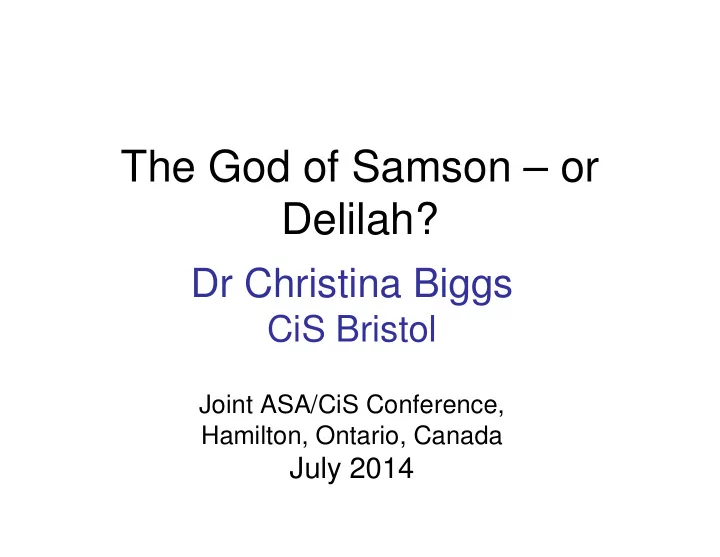

The God of Samson – or Delilah? Dr Christina Biggs CiS Bristol Joint ASA/CiS Conference, Hamilton, Ontario, Canada July 2014
Q: Are we betraying God ? Is modern scientific “rescue theodicy” in fact a Delilah portraying God as weak? Are we limiting God to: � Influencing natural world only in initial design and thereafter a helpless onlooker; � Miracles only within quantum uncertainty; � Private, unprovable revelation to humans ; � Intending suffering only accidentally? Task: To rediscover the God of Samson: suffering with creative power for triumph.
Three guides back towards Samson Thomas Aquinas (1225-1274): an omnipotent God; the future exists already. God “gives saints grace to merit glory” and permits sin for the greater good. Alfred Whitehead Sarah Coakley (1951-): (1861-1947): Basic unit Evolution as rewarding = thinking and feeling intentional, sacrificial entities; the future is altruism points to God’s open; God improvises vision of a flamboyantly creatively, aiming for generous future society mathematically Proposal: to combine these three beautiful unity approaches by considering three -in-diversity and further “science parables” harmony
1. Clay parable: A model for free will? • A consistent pattern in “pinball machine” environment • Random scatter stays roughly within this “envelope” Aquinas : God can “tilt the pinball machine”. Q: Does he?
2. Sound parable: How does the conductor influence the sound of the orchestra? A: He not only directs but also trains the players. Q: Are we developing a consistently sweet tone?
3. Genetics parable: a picture embedded within evolution shows that suffering ends in redemption.
Summary Whitehead’s basic unit = sentient entities with an open future � genuine free will � Coakley ’s intention and decision for humans God is confident …God has a 1. Clay parable: of achieving his means of Free-will behaviour purpose only if … persuasion: has a predictable pattern either if Aquinas’ God Result : The “tilts the pinball 3. Genetics God of Samson machine” or… parable: Suffering ends not Delilah! with redemption. y n o m y n r a o m H r = a 2. Sound parable: y H n = i t s y e n D i t s : e d a D a s e : a h d h a e a g s t e a i Whitehead’s creatively h h n h e i W r g t e i h f n f u i W r S e f : f y u e S t l o k : y o a e b t o l “ o k C o a e b improvising God trains t h u o “ t C b n e t i h u e t b c n g a i n p l e i c p y g a o r n p l e l a i p r y v o e o r p d e l a m musicians to develop a r r v o e e o p d t f m , r e e o f t i f l , s e m . i h f i s t l i f s u m . o i h r t s ” t p a l i f u o m l r consistent sweet sound. a t ” a p i a l c c m i l f a r i a i c c c a i f s r i f c o a y s t f e o i c y o t e s i c a o s a
References Aquinas, T. (1225-1274) Summa Theologica, Prima Pars, Qq.14, 19, 22, 23. Full text available free and online at e.g. http://home.newadvent.org/summa/, last accessed 14/07/2014. Barbour, I (Ed.) (1968) Science and Religion: New Perspectives on the Dialogue, Part 3: Evolution and the Doctrine of Creation. SCM Press: London Coakley, S. (2012) Gifford Lectures, University of Aberdeen, http://www.abdn.ac.uk/gifford/about/2012-giff/, last accessed 14/07/2014. Doye J, Goldby I, Line C, Lloyd S, Shellard P, Tricker D (1995) Contemporary perspectives on Chance, Providence and Free Will . Science and Christian Belief,7: pp.117-139 Whitehead, A.N. (1910), Process and Reality, Ch 1-3. Cambridge University Press: London
Acknowledgements Advice and guidance: Ernest Lucas, Bristol Baptist College Justin Stratis, Trinity College Bristol Access to theological libraries: Paul Roberts, Trinity College Bristol Michael Brealey, Bristol Baptist College Funding for travel and conference fee: Lady Clare Fund, Clare College, Cambridge Bursary Committee, Christians in Science UK Neutron scattering data, samples and instrument diagrams: Professor Michael Hayes, University of Limerick TFXA, ISIS, Rutherford Appleton Laboratory, Didcot, UK Portable sound analysis equipment and software: Digital recorder - H2 Zoom, available to buy from Maplin Stores UK Audacity – free software from http://www. audacity.sourceforge.net Orchestral music - Keynsham Orchestra, recorded by author
Recommend
More recommend